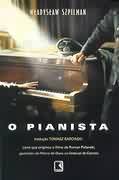Title: O Pianista
Author: Władysław Szpilman
First published January 1, 1946
237 pages, Paperback
ISBN: 9788501063502 (ISBN10: 8501063509)
Rating: 4.24
Overview
September 23, 1939. Wladyslaw Szpilman, a young and talented Polish pianist, was playing Chopin’s Nocturne in C Minor live on the radio.
In the streets, the explosions of German bombs almost silenced the fabulous melody. It would be the last live broadcast from Warsaw, abruptly interrupted by a German bomb.
This is Szpilman’s story, told in first person, a testament to an impressive survival during World War II. Despite losing all those who were closest to him, Szpilman manages to celebrate courage, strength, and life.
An absolutely brilliant work, already adapted for the big screen.
About the Author
Władysław Szpilman was a talented pianist, composer, and author. He is most recognized for his role as the main character in the film “The Pianist,” directed by Roman Polański.
The movie is based on Szpilman’s memoir, which tells the story of his survival during the Holocaust. In 1998, the President of Poland awarded him the Kommandor Order with a Star of Polonia Restituta, a significant honor.
Editoral Review
O Pianista by Władysław Szpilman, first published on January 1, 1946, is an autobiographical account that showcases the human spirit’s resilience during one of the darkest periods of human history. Władysław Szpilman, a Polish-Jewish pianist, chronicles his struggles and triumphs during the Nazi occupation of Warsaw, which runs from 1939 to 1945.
This masterpiece is not in the typical format of a linear storyline. Instead, it captures the emotional and psychological trauma of living under Nazi occupation, followed by the chaos that ensued after the destruction of Warsaw.
Szpilman’s writing style is not only educational but also poetic, leaving readers with evocative images and emotions. He masterfully weaves in flashbacks, which are integral to understanding the character’s development and their motivations.
Using his own experiences, Szpilman connects the reader with the terrible human loss and suffering that occurred during the Holocaust. One of the most wrenching parts of the book is the sense of desperation that permeates the chapters that describe Szpilman’s family’s efforts to survive while hiding in abandoned buildings.
The setting of O Pianista is in Warsaw, a historical city that goes through significant transformation under Nazi Germany’s occupation. The author describes, in intricate detail, how the city changes from a vibrant hub into a war-torn wasteland in such a short period.
Szpilman’s account of people’s struggles to survive against the odds is compelling, and his bravery in telling the story must be celebrated. Readers will appreciate the historical significance of the book, as it presents a first-hand account of Nazi atrocities.
Władysław Szpilman’s O Pianista is a masterpiece in every sense of the word. It’s evocative, emotionally charged, and educational.
The book’s themes of resilience and hope in the midst of a crisis are universal, and the historical importance is evident. Szpilman’s writing style, character development, pacing, and plot structure are impeccable.
The only area where the book falls short is the lack of a detailed section on Szpilman’s life after the war. A potential improvement would be to add an epilogue or afterword, highlighting how his experiences informed his subsequent life.
In conclusion, O Pianista is a must-read for anyone interested in history, human psychology, and how to navigate through turbulent times. It is a book for those seeking to grasp what it means to be human and the resilience of the human spirit when faced with insurmountable challenges.
It’s hard to give a rating to a book like this, but the depth of emotion, themes, and historical significance earn O Pianista five stars out of five. -Washington Post



